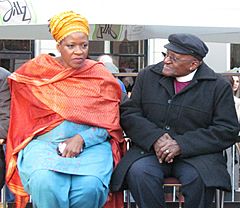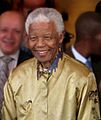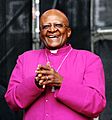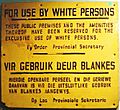Desmond Tutu facts for kids
Quick facts for kids The Most Reverend OMSG CH GCStJ |
|
|---|---|
|
|
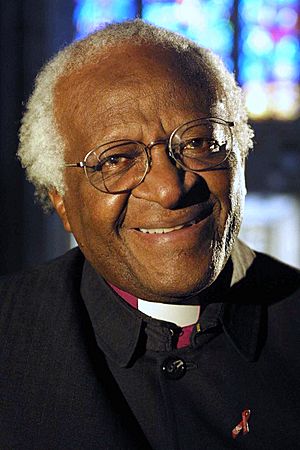
Tutu c. 2004
|
|
| Church | Anglican Church of Southern Africa |
| See | Cape Town |
| Enthroned | 7 September 1986 |
| Reign ended | 23 June 1996 |
| Predecessor | Philip Russell |
| Successor | Njongonkulu Ndungane |
| Other posts |
|
| Orders | |
| Ordination |
|
| Consecration | 1976 |
| Personal details | |
| Birth name | Desmond Mpilo Tutu |
| Born | 7 October 1931 Klerksdorp, South Africa |
| Died | 26 December 2021 (aged 90) Cape Town, South Africa |
| Spouse |
Nomalizo Leah Shenxane
(m. 1955) |
| Children | 4, including Mpho |
| Education |
|
| Signature | |
Desmond Mpilo Tutu (7 October 1931 – 26 December 2021) was a famous South African Anglican bishop and human rights activist. He became the first black African to hold important church positions, like Bishop of Johannesburg (1985–1986) and then Archbishop of Cape Town (1986–1996). He won the 1984 Nobel Peace Prize for his work against apartheid.
Contents
Early Life and Education
Desmond Mpilo Tutu was born on 7 October 1931 in Klerksdorp, South Africa. His family was poor, and his father was a school principal. Desmond was a mix of Xhosa and Motswana heritage. At home, they spoke the Xhosa language.
In 1936, his family moved to Tshing. There, Desmond started school and learned Afrikaans. He also became a helper at St Francis Anglican Church. He loved to read, especially comic books and fairy tales.
High School and Illness
Desmond went to Johannesburg Bantu High School in 1945. He was a great student and loved playing rugby. To earn money, he sold oranges and worked as a caddie for white golfers.
He also helped at the Church of Christ the King in Sophiatown. The priest there, Trevor Huddleston, was a big influence on him. In 1947, Desmond got tuberculosis and spent 18 months in the hospital. Father Huddleston visited him often. He finished school in 1950.
Becoming a Teacher
Desmond wanted to study medicine at the University of the Witwatersrand. But his parents could not afford the fees. Instead, he got a scholarship to Pretoria Bantu Normal College in 1951 to become a teacher.
He was active in student life, leading clubs and societies. During a debate, he met Nelson Mandela, who would later become president of South Africa. They would not meet again until 1990.
After college, Desmond taught English at Madibane High School in 1954. The next year, he moved to Krugersdorp High School, where he taught English and history.
Fighting for Justice: The Anti-Apartheid Movement
Desmond Tutu was a very important leader against apartheid in South Africa. Apartheid was a system where people were separated by race, and white people had all the power. Black people had very few rights.
Tutu believed in peaceful protest. He also asked other countries to put economic pressure on South Africa. He wanted everyone to have the right to vote, no matter their race.
A Voice for Change
- In 1960, he became an Anglican priest. He then moved to the United Kingdom to study religion at King's College London.
- He returned to southern Africa in 1966 and taught at different seminaries and universities.
- In 1975, he became the dean of St Mary's Cathedral in Johannesburg. Then he became the Bishop of Lesotho.
- From 1978 to 1985, he was the Secretary General of the South African Council of Churches (SACC). This job made him a leading voice against apartheid.
- In 1985, Tutu became Bishop of Johannesburg. In 1986, he became the Archbishop of Cape Town. This was the highest position in the Anglican Church in southern Africa. He was the first black African to hold this role.
Tutu was very popular among black South Africans. He was known around the world for his work against apartheid.
Winning the Nobel Peace Prize
By the 1980s, Desmond Tutu was a hero to many black South Africans. Only Nelson Mandela was as well-known. In 1983, he became a supporter of the United Democratic Front (UDF), a group fighting apartheid.
Tutu's strong words against apartheid made many white South Africans angry. He even received threats from white extremist groups.
In 1984, Tutu visited New York. He spoke to the United Nations Security Council and the Senate. He also met with US President Ronald Reagan at the White House. He tried to convince Reagan to change his policies towards South Africa, but he was not successful.
While in New York, Tutu learned he had won the 1984 Nobel Peace Prize. He had been nominated three times before. In December, he went to Oslo for the award ceremony. He shared the prize money with his family, his church staff, and a scholarship fund for South Africans living in exile. He was the second South African to win this award.
Life After Apartheid
After the 1994 general election, Nelson Mandela became president. Mandela chose Tutu to lead the Truth and Reconciliation Commission. This group investigated human rights abuses that happened during apartheid. It aimed to help the country heal from its painful past.
In 2010, Tutu retired from public life. He wanted to spend more time with his family, reading, writing, praying, and thinking.
His Personal Side
On 2 July 1955, Desmond Tutu married Nomalizo Leah Shenxane. She was a teacher he met in college. They had a Roman Catholic wedding because Leah was Catholic, even though Desmond was Anglican.
They had four children: Trevor, Thandeka, Naomi, and Mpho. All their children went to the Waterford Kamhlaba School in Swaziland. People who knew Tutu described him as a loving but strict father.
What Made Him Special?
Desmond Tutu was described as a "man of many layers." He was warm, energetic, and friendly. Even as a child, he was very smart and hard-working. He had a kind heart and did not like anything that hurt others. He was also very honest.
Tutu rarely got angry with people in person. But he would get upset if he felt someone was questioning his honesty. He trusted people easily, which some friends thought was not always wise.
He cared a lot about African traditions of politeness. He could be offended by rude behavior or careless words. He also disliked gossip among his staff.
Tutu was very punctual and expected others to be on time too. He was good at remembering people's birthdays and anniversaries. He also made an effort to visit and spend time with people in his church, even those who did not like him.
He was known for being an amazing public speaker. His speeches could "hold an audience spellbound."
Desmond Tutu's Wisdom
Here are some famous quotes from Desmond Tutu:
- “Do your little bit of good where you are; it's those little bits of good put together that overwhelm the world.”
- “Don't raise your voice, improve your argument.”
- “Forgiving is not forgetting; its actually remembering--remembering and not using your right to hit back. Its a second chance for a new beginning.”
- “Differences are not intended to separate, to alienate. We are different precisely in order to realize our need of one another.”
- “If you are neutral in situations of injustice, you have chosen the side of the oppressor.”
His Legacy
Desmond Tutu died from cancer in Cape Town on 26 December 2021, at the age of 90.
His body was placed in St. George's Cathedral for two days before his funeral. This allowed people to pay their respects. For several days, the cathedral bells rang for 10 minutes each day at noon. Famous landmarks like Table Mountain were lit up in purple to honor him.
A Funeral Mass (a special church service for the dead) was held for Tutu at St. George's Cathedral on 1 January 2022. Only 100 people could attend because of COVID-19 pandemic rules. His ashes are buried in St. George's Cathedral.
Interesting Facts About Desmond Tutu
- Tutu had an older sister, Sylvia Funeka, who called him "Mpilo," meaning 'life.'
- He was often sick as a child. Polio affected his right hand.
- He had a very close relationship with his father.
- Besides English, Tutu could speak Zulu, Sotho, Tswana, and Xhosa.
- He loved literature and reading throughout his life.
- He was a fan of cricket.
- To relax, Tutu enjoyed listening to classical music and reading books about politics or religion.
- His favorite foods included samosas, marshmallows, fat cakes, and Yogi Sip.
- Tutu woke up at 4 AM every morning. He would go for an early walk, pray, and take part in the Eucharist (a Christian service). On Fridays, he would fast until supper.
- Tutu was a very devoted Christian from a young age.
Writings
Desmond Tutu wrote many books, often collections of his speeches and sermons:
- Crying in the Wilderness, 1982.
- Hope and Suffering: Sermons and Speeches, 1983.
- The War Against Children: South Africa's Youngest Victims, 1986.
- The Words of Desmond Tutu, 1989.
- The Rainbow People of God: The Making of a Peaceful Revolution, 1994.
- Worshipping Church in Africa, 1995.
- The Essential Desmond Tutu, 1997.
- No Future Without Forgiveness, 1999.
- An African Prayerbook, 2000.
- God Has a Dream: A Vision of Hope for Our Time, 2004.
- Desmond and the Very Mean Word, 2012.
- The Book of Forgiving: The Fourfold Path for Healing Ourselves and Our World, 2015.
- The Book of Joy: Lasting Happiness in a Changing World, coauthored by His Holiness the 14th Dalai Lama, 2016.
Images for kids
-
Tutu with former Irish president Mary Robinson, British foreign secretary William Hague, and former US president Jimmy Carter in 2012
-
Tutu with the Dalai Lama, both Nobel Peace Prize laureates, in Vancouver, British Columbia, in 2004
-
Tutu at the World Economic Forum in 2009
-
Tutu at the University of Pennsylvania
See also
 In Spanish: Desmond Tutu para niños
In Spanish: Desmond Tutu para niños
- List of black Nobel laureates
- List of civil rights leaders
- List of peace activists
- Political theology in Sub-Saharan Africa
- Reconciliation theology
 | Janet Taylor Pickett |
 | Synthia Saint James |
 | Howardena Pindell |
 | Faith Ringgold |


